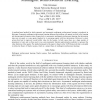83 search results - page 2 / 17 » Adapting Reinforcement Learning for Computer Games: Using Gr... |
GECCO
2009
Springer
13 years 10 months ago
2009
Springer
We apply CMA-ES, an evolution strategy with covariance matrix adaptation, and TDL (Temporal Difference Learning) to reinforcement learning tasks. In both cases these algorithms se...
AIIDE
2008
13 years 7 months ago
2008
Human experience with interactive games will be enhanced if the software agents that play the game learn from their failures. Techniques such as reinforcement learning provide one...
IAT
2003
IEEE
13 years 10 months ago
2003
IEEE
A gradient-based method for both symmetric and asymmetric multiagent reinforcement learning is introduced in this paper. Symmetric multiagent reinforcement learning addresses the ...
ISPE
2003
13 years 6 months ago
2003
A two stage approach to co-ordination in a multi-agent society is presented. The first stage involves agents learning to co-ordinate their activities based on local and global uti...
CG
2006
Springer
13 years 7 months ago
2006
Springer
Temporal difference (TD) learning has been used to learn strong evaluation functions in a variety of two-player games. TD-gammon illustrated how the combination of game tree search...


